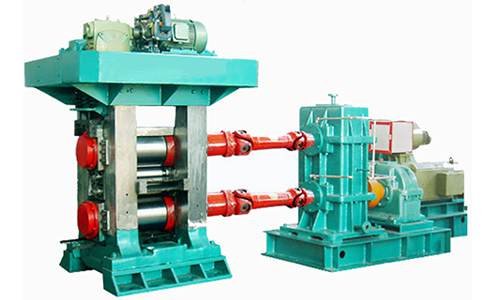Rolling mills are essential in metalworking and manufacturing. They shape and process metal into useful products. The rolling mill roll is the centerpiece of any mill. It determines the quality, efficiency, and longevity of the process. These cylindrical tools apply force to the metal, reducing its thickness and shaping it into sheets, strips, and other forms. This article explores the role of rolling mill rolls in metal processing, their types, and their importance in manufacturing.
1. Understanding Rolling Mills
A rolling mill is a machine used in the metalworking industry to shape metal by passing it through a set of rollers. These machines can process a wide variety of metals, including steel, aluminum, copper, and other non-ferrous metals. The basic principle behind the operation of a rolling mill is the application of compressive force through rotating rolls, which squeeze and elongate the metal.
Rolling mills primarily fall into two categories based on their operation: hot rolling mills, where operators heat metals before processing, and cold rolling mills, where they process metals at or near room temperature. The choice of rolling mill depends on the desired product characteristics and the specific requirements of the material.
2. The Role of Rolling Mill Rolls
At the heart of the rolling mill’s operation are the rolls. These cylindrical tools are crucial in controlling the material’s thickness, width, and mechanical properties. The rolls work in conjunction with other components of the mill, such as the supporting frame, motors, and hydraulic systems, to ensure that the metal undergoes the required deformation.
The primary function of the rolls is to apply mechanical pressure to the metal as it passes through the rolling process. The metal’s thickness is reduced, and its shape is modified. In some cases, rolls are used to impart specific surface textures or to perform critical tasks like elongation, compression, and bending of the metal.
Rolling mill rolls are subjected to extreme forces during operation, including high levels of pressure, heat, and friction. Therefore, the design, material composition, and maintenance of the rolls are of paramount importance in ensuring the efficiency and effectiveness of the rolling process.
3. Types of Rolling Mill Rolls
Rolling mill rolls come in several different types, each designed for specific purposes based on the nature of the material being processed. The two main types of rolls are:
- Work Rolls: These are the primary rolls that come into direct contact with the metal. Work rolls are responsible for reducing the thickness of the material. They must be durable, heat-resistant, and able to withstand high levels of mechanical stress. Work rolls are typically made from materials like high-carbon steel, alloy steel, or composite materials, which offer strength and resistance to wear.
- Backup Rolls: Backup rolls are used to support the work rolls and reduce deflection during the rolling process. They are typically larger and heavier than work rolls. While they do not directly interact with the material, they play a crucial role in maintaining the alignment and stability of the work rolls. Backup rolls are typically made of similar materials as work rolls but may vary in design depending on the mill configuration.
Additionally, other specialized rolls serve specific applications, such as pressure rolls, guide rolls, and coating rolls. Each roll plays a unique role in the rolling process.
4. Material Selection for Rolling Mill Rolls
The material used for manufacturing rolling mill rolls is critical to their performance and longevity. The primary factors that influence material selection include:
- Strength: Rolls need to withstand high compressive forces during the rolling process without deforming or cracking.
- Wear Resistance: Rolls are exposed to significant abrasion as the metal passes through. High wear resistance ensures longer roll life and reduced downtime for maintenance.
- Heat Resistance: In hot rolling mills, the rolls are subjected to extreme temperatures. Heat-resistant alloys are necessary to maintain the roll’s integrity at elevated temperatures.
- Toughness: Rolls should be tough enough to resist impact and avoid cracking, especially when processing materials with varying hardness.
- Surface Hardness: The surface hardness of the rolls must be sufficient to resist wear and prevent excessive friction that could damage the metal or the rolls.
Common materials used for rolling mill rolls include:
- High-Carbon Steel: Offers good wear resistance and hardness but may be prone to cracking at high temperatures.
- Alloy Steel: Contains elements like chromium, molybdenum, and vanadium to enhance strength, wear resistance, and toughness.
- Cast Iron: Used for certain backup rolls due to its excellent castability and high wear resistance.
- Composite Materials: In some cases, composite materials may be used for special applications, offering a combination of wear resistance, strength, and toughness.
5. Importance of Rolling Mill Rolls in Metal Processing
Rolling mill rolls are indispensable in determining the quality and characteristics of the final product. Some of the key reasons why these rolls are so important include:
- Precision and Consistency: Rolling mill rolls help process metal to the desired dimensions with high precision. This precision is crucial in industries that require exact specifications, such as the production of thin sheets, foils, or precision-engineered parts.
- Surface Quality: The surface quality of rolled metal depends on the condition of the rolls. Worn or damaged rolls can lead to defects such as surface scratches, irregularities, or poor finish. High-quality rolls contribute to smooth, defect-free metal surfaces that are crucial in applications like automotive parts, aerospace components, and electronics.
- Energy Efficiency: Properly designed and maintained rolls ensure that the rolling process is energy-efficient, reducing the overall cost of production. Poor roll performance can lead to increased energy consumption due to inefficiencies in the deformation process.
- Reduced Downtime: The longevity of the rolls directly affects the uptime of the rolling mill. High-quality rolls that are resistant to wear and heat damage reduce the frequency of roll changes, leading to less downtime and improved productivity.
- Quality of Finished Products: The rolling process significantly influences the final mechanical properties of the rolled metal, including strength, hardness, and flexibility. Rolls with the appropriate hardness and surface finish are essential for achieving the desired material properties in products like structural steel, sheet metal, and wires.
6. Challenges and Maintenance
Given the extreme conditions that rolling mill rolls endure, maintenance plays a critical role in ensuring the longevity and performance of these tools. Regular inspections help detect early signs of wear or damage, such as cracks, surface degradation, or dimensional changes. Technicians can use advanced technologies like non-destructive testing (NDT), ultrasonic testing, and thermography to assess the rolls’ condition and decide when they require replacement or repair.
Common issues faced by rolling mill rolls include:
- Surface Cracking: Caused by thermal stresses, friction, or material defects.
- Wear and Tear: The repetitive contact with metal leads to gradual loss of material from the roll surface.
- Deflection: Due to excessive loads, rolls can deform, affecting the quality of the product.
7. Conclusion
Rolling mill rolls play a pivotal role in the metal processing industry, impacting the efficiency, quality, and cost-effectiveness of the entire rolling operation. Whether in hot or cold rolling mills, these rolls are essential for shaping metal and ensuring that it meets the required specifications. The selection of the right material, the design of the rolls, and regular maintenance are key factors in ensuring the optimal performance of rolling mills. As the demand for high-quality metal products continues to rise, the role of rolling mill rolls will remain central to the success of metal processing operations worldwide.
Tinvo is a custom rolling mill rolls design and manufacturing company, specializing in creating high-performance rolls for various industrial applications. They deliver precision-engineered, durable solutions tailored to meet the specific needs of rolling mill operations.













Leave a Reply